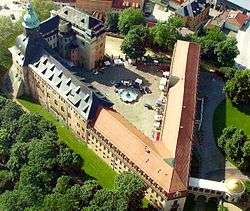House of Schwarzburg
| House of Schwarzburg | |
|---|---|
 | |
| Country | Schwarzburg-Rudolstadt, Schwarzburg-Sondershausen |
| Titles | Count, Prince |
| Founded | 12th century |
| Founder | Sizzo I, Count of Schwarzburg |
| Final ruler | Prince Günther Victor |
| Deposition | 1918 |



The House of Schwarzburg is one of the oldest noble families of Thuringia. Upon the death of Prince Friedrich Günther in 1971, a claim to the headship of the house passed under Semi-Salic primogeniture to his elder sister, Princess Marie Antoinette of Schwarzburg who married Friedrich Magnus V, Count of Solms-Wildenfels.[1][2] Reigning over the County of Schwarzburg and founded by Sizzo I of Schwarzburg (died 1160), the family split in the 16th century into the lines of Schwarzburg-Sondershausen and Schwarzburg-Rudolstadt, with the Sondershausen dying out in 1909.
Family History
The County of Schwarzburg was a state of the Holy Roman Empire from 1195 to 1595, when it was partitioned into Schwarzburg-Rudolstadt and Schwarzburg-Sondershausen. It was ruled by counts from the House of Schwarzburg. Schwarzburg Castle was first mentioned in a 1071 deed. In 1123 Count Sizzo III of Käfernburg (Kevernburg), mentioned by the medieval chronicler Lambert of Hersfeld and according to the Annalista Saxo a grandson of Prince Yaropolk Izyaslavich of Turov by his mother, rebuilt the castle calling himself a "Count of Schwarzburg". Sizzo also established Georgenthal Abbey and in 1157, he accompanied Emperor Frederick I Barbarossa during his campaign against High Duke Bolesław IV the Curly of Poland.
In 1197, Sizzo's grandson Heinrich II divided the common heritage with his brother Günther III and made Schwarzburg Castle his residence. His territory then also comprised the nearby castle of Blankenburg.
The most famous family member is Günther XXI von Schwarzburg. In 1349, he was elected as German king by the majority of electors. But, due to waning support, he renounced some month later and died shortly after.
The Schwarzburg lands were again divided among his successors until in 1538 when Count Günther XL the Rich was able to unite the territories including Frankenhausen and Rudolstadt under his rule. He was succeeded by his eldest son Günther XLI. However, after his death in 1583, his younger brothers again divided the county: John Günther I received the territory around Arnstadt, later called Schwarzburg-Sondershausen, while Albrecht VII inherited the lands of Schwarzburg-Rudolstadt. The partition was finally confirmed by the 1599 Treaty of Stadtilm.
Counts of Schwarzburg and Käfernburg
- Sizzo I (–1005)
- Sizzo II (–1075)
- Günther I (–1109), married Mechthild, daughter of Prince Yaropolk Izyaslavich of Turov
- Sizzo III (1109–1160)
- Günther II (1160–1197)
- Heinrich II (1197–1236), Count of Schwarzburg-Blankenburg
- Günther VII (1236–1274)
- Günther IX (1274–1289)
- Günther XII (1289–1308)
- Heinrich VII (1308–1324)
County divided
- Günther XL (1526–1552)
County divided again in 1571
- Albrecht VII of Schwarzburg-Rudolstadt (1583–1605)
- John Günther I of Schwarzburg-Sondershausen (1583–1586)
Counts and Princes of Schwarzburg-Rudolstadt
- 1574–1605: Count Albrecht VII (1537–1605)
- 1605–1630: Count Charles Günther I (1576–1630), succeeded by his brother Louis Günther I
- 1612-1634: Count Albrecht Günther (1582-1634)
- 1630–1646: Count Louis Günther I (1581–1646)
- 1646–1662: Regent Emilie of Oldenburg-Delmenhorst (1614–70)
- 1662–1710: Count Albert Anton (1641–1710)
- 1710–1718: Prince Louis Frederick I (1667–1718)
- 1718–1744: Prince Frederick Anton (1692–1744)
- 1744–1767: Prince John Frederick (1721–67)
- 1767–1790: Prince Louis Günther II (1708–90)
- 1790–1793: Prince Frederick Charles (1736–93)
- 1793–1807: Prince Louis Frederick II (1767–1807)
- 1807–1814: Regent Caroline Louise of Hesse-Homburg (1771–1854)
- 1814–1867: Prince Frederick Günther (1793–1867)
- 1867–1869: Prince Albert (1798–1869)
- 1869–1890: Prince Georg Albert (1838–90)
- 1890–1918: Prince Günther Victor (1852–1925)
Counts and Princes of Schwarzburg-Sondershausen
- 1552–1586: John Günther I
- 1586–1631: Günther XLII, with Anton Henry, John Günther II and Christian Günther I
- 1631–1638: Günther XLII, with Anton Henry and Christian Günther I
- 1638–1642: Günther XLII, with Christian Günther I
- 1642–1643: Günther XLII, with Anton Günther I
- 1643–1666: Anton Günther I
- 1666–1697: Christian William, with Anton Günther II
- 1697–1716: Anton Günther II
- 1697 – 10 May 1721: Christian William
- 10 May 1721 – 28 November 1740: Günther XLIII
- 28 November 1740 – 6 November 1758: Henry XXXV
- 6 November 1758 – 14 October 1794: Christian Günther III
- 14 October 1794 – 19 August 1835: Günther Friedrich Karl I
- 19 August 1835 – 17 July 1880: Günther Friedrich Karl II
- 17 July 1880 – 28 March 1909: Karl Günther
- 28 March 1909 – November 1918: Günther Victor
See also
References
- ↑ The House of Schwarzburg on Heraldica.org
- ↑ James, John Almanach de Gotha, Volume I, 2013.
External links
- (in English) House Laws of Schwarzburg
